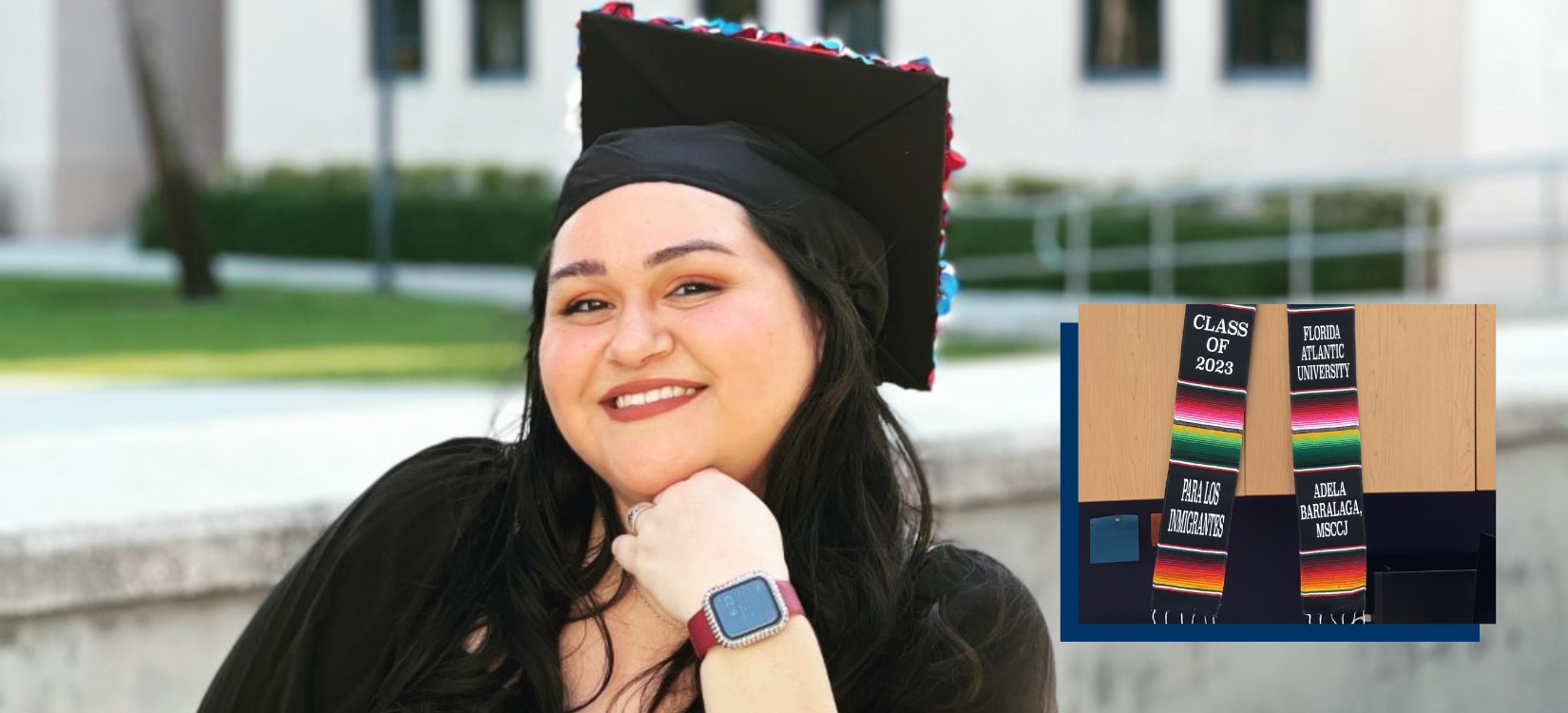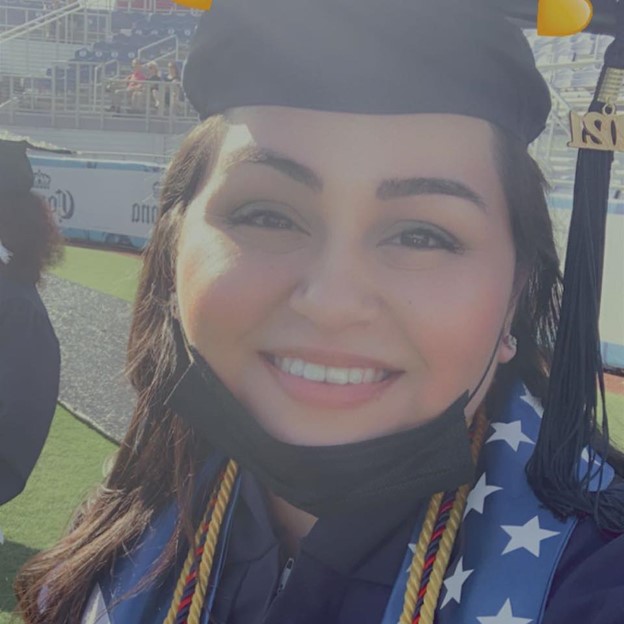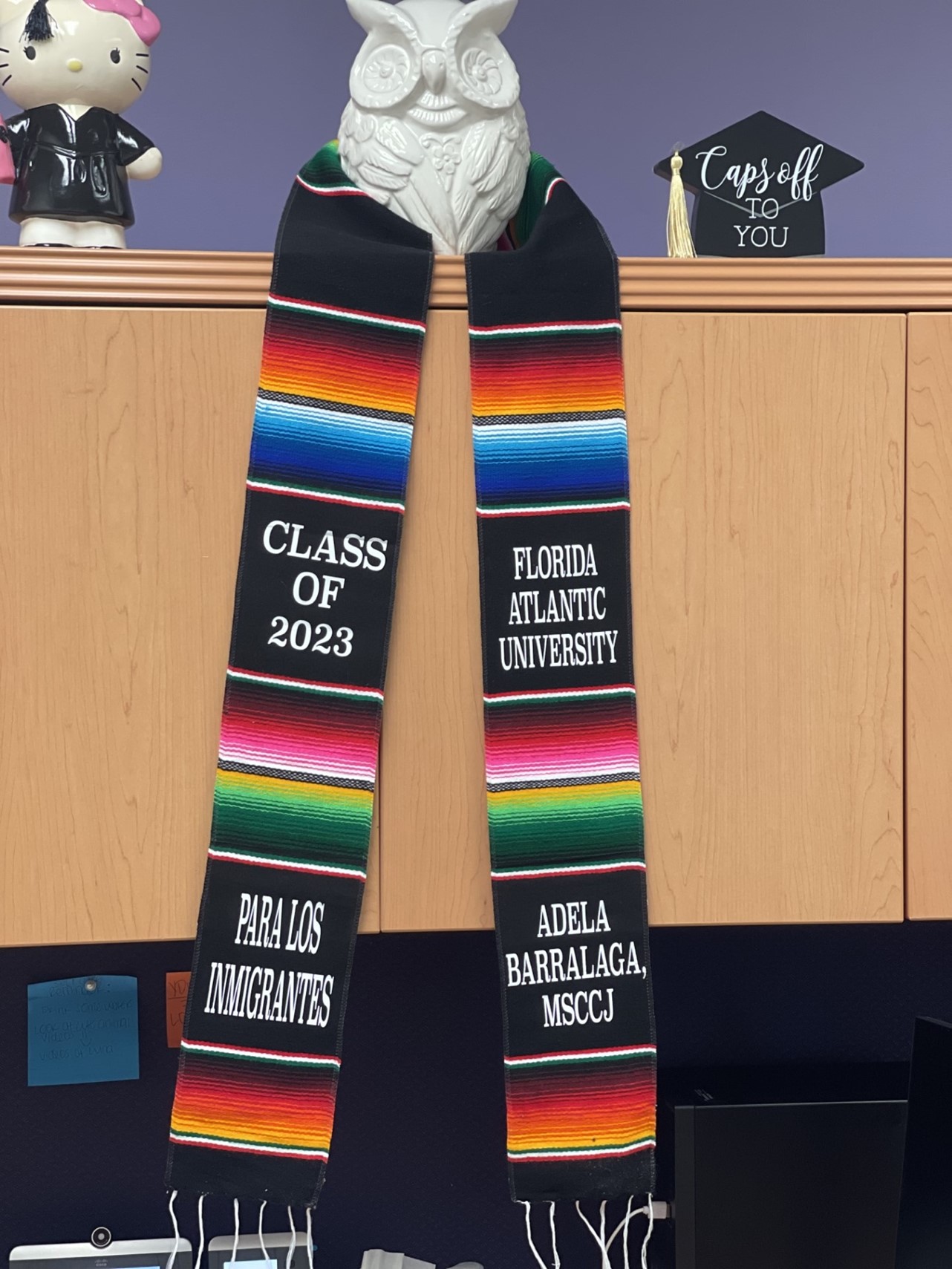Dual Alumnus On How Family’s Immigration Story Is Fueling Her Future Goals
Wednesday, Jun 28, 2023
The Graduate College recently welcomed a new Admissions Coordinator who is a familiar face in the College of Social Work and Criminal Justice. Adela Barralaga is a dual alumna of Florida Atlantic University, having received her Bachelor of Arts in Criminal Justice in Spring 2021 and her Master of Science in Criminology and Criminal Justice in Spring 2023.
We recently had the opportunity to connect with Ms. Barralaga and hear more about her on-campus role, the classes and professors that impacted her most, and the dream she carries for her future.
As a first-generation college student, what led you to pursue a B.A. in Criminal Justice and most recently a M.S. in Criminology and Criminal Justice?
Criminal Justice has been my passion since I was a little girl. I used to watch any and every TV show imaginable that was based on the Criminal Justice System. As a first-generation college graduate, I saw how important it was to get an education and even more so, pursue what I loved, especially growing up as a minority with so little. I was fortunate enough to have gotten myself through college on my own dime and pursued all possibilities that were available to me due to my citizenship when there are so many who want the same but do not have the means to do it. When I got my associates in 2017, I applied to FAU not knowing how it would change my life and outlook on life as a first-generation student. FAU has showed up and supported me every step of the way through my Bachelor’s and Master’s.
What were some of your favorite courses and professors, and why?
Some of my favorite undergraduate courses were Human Trafficking, Forensics, Gangs, Terrorism, and Criminal Law. What made these classes memorable were the professors and how dedicated they were in teaching us the material. I was fortunate enough to have been a graduate teaching assistant for Dr. Paula Prior’s Drugs and Crime class. She helped shape me as a student and helped me become a better writer. I had a great year assisting her.
Every course in its own way changed my life because of how much I enjoyed and grasped onto everything I learned. My three favorite graduate courses were Sex Offender Policies/Practices, Prisoner Reentry, and my Capstone course. Dr. Calli Cain is amazing and very dedicated to her work. No matter how hard and difficult the subject may be, she made sure we were all checking in and let us engage with each other and share our thoughts as we went through the class and build a bond. Dr. Ralph Fretz was great and really helped me envision what I want to do with my career upon graduation after taking his Prisoner Reentry course. Dr. Gabriel T Cesar takes the cake as someone who really made a difference in my time here at FAU and as a graduate student. I would not have been able to put my thoughts into words and into a project without his knowledge, time, and honesty. I also cannot forget how great Dr. Lincoln Sloas was to us during the pandemic. He really made Zoom classes memorable and is such an incredible professor in the way he is present for his students.
Please share an overview of your capstone project on Immigration Detention and the Road to Reentry Programs.
My Capstone project was based on something I am very passionate about since it hits so close to home. The criminalization of immigration has led to record numbers of detentions and arrests for simply not having legal status in the U.S. Many of the individuals that are detained or arrested have already established themselves and their families here, and once they are detained and released back into their community, they must face the same barriers as some would being a citizen of the U.S. These barriers are sometimes worse, and they have no programs available to them because of the criminalization of immigration. What my capstone project highlighted was that if there were reentry programs out there to help immigrants upon release into their communities, there would not be so much over-crowding in immigration detention centers nor would there be a need to mix them in prison populations where they may be exposed to worse conditions than what they have already experienced in some of these detention centers.
Unfortunately, we have policy implications such as Title 42 and the 1996 laws that have contributed to the long history of criminalizing immigration. Title 42 passed during COVID-19 under the Trump administration prohibiting the entry of any illegal immigrants and if seeking asylum, immigrants would have to wait in Mexico while their case is being processed. The 1996 laws passed in 1996 retroactively deporting anybody who committed a felony, out of an extended list of felonies, and once again criminalizing immigration. Most recently, Governor DeSantis passed and signed into law SB 1718 and HB 1617 which will continue to criminalize immigration in a way we have not seen before.
Putting a reentry program together into practice as I hoped to, has now become difficult as many of the newfound laws criminalize anyone knowingly helping immigrants. Immigrants are left out of many benefits, and this is just one more to the list especially when it becomes illegal to want to help.
 Barralaga at her 2021 undergraduate commencement ceremony.
Barralaga at her 2021 undergraduate commencement ceremony.
What are some of the largest barriers to reentry for detained immigrants?
Some of the largest barriers to reentry for detained immigrants are picking back up from where they left of when it comes to work, their home, and their family life. For many that are detained, they might have worked extremely hard to have gotten to where they were before getting detained. Once they are released, not many employers are keen on waiting or giving them a second chance, leaving them to have to start from scratch all over again. Another large barrier is the lack of assistance in counsel they may have due to language barriers. Legal counsel is not guaranteed nor is the court forced to provide them with an interpreter because of their legal status, which can play a large factor in their court case while they are out on non-retainers.
What are some of the programs and solutions available locally and nationally that our communities may not be aware of?
There are many groups and coalitions that help with legal counsel for immigrants specifically such as Legal Aid and a large variety of church groups all over South Florida that provide interpreted legal assistance pro bono. There are also many advocacy groups that work with the ACLU in advocating immigrant rights. While that is the only help that is known, there may be also a large variety of groups and organizations that do the type of work I am advocating for but do so in an undisclosed manner in fear or prosecution and being shut down.
Your parents immigrated from Honduras. If you were invited by policymakers to share your perspectives on U.S. immigration policy, what is the single most important message you would want to leave with them?
I would remind policymakers that immigrants have helped build the United States to where it is. When you are driving down the highway and you see a high-rise building, be reminded that it was built by the hands of immigrants. My family is very talented in the way they made something out of nothing when they got to the United States. I go to shopping malls and pass by some of the most expensive buildings and get reminded that my dad, brothers, sister, brother-in-law, or uncle helped build and paint that building. Immigrants are here to help build the United States into something beautiful, not destroy it. They are human beings and deserve compassion and second chances, just as many citizens do when they are released from prison.
 Barralaga’s graduation sarape that she dedicated to immigrants.
Barralaga’s graduation sarape that she dedicated to immigrants.
Tell us about the non-profit organization you hope to establish?
This non-profit I envision and hope to develop alongside some of my colleagues focuses on reentry support services for immigrants released from incarceration in the United States. While I know right now it will be challenging, I am looking into networking with like-minded individuals who have working organizations in Sanctuary cities where funding is allowed for these types of programs. In doing so, I hope to connect and build bonds that will help me make a difference in reentry among immigrants whether it is here in Florida or in Sanctuary cities.
This project is close to my heart due to my brother’s case and whom I advocate for. He migrated to the U.S legally when he was 15 and made a life of his own. Unfortunately, as a teenager, he found himself participating in activities that placed him into the wrong place, wrong time category. His legal counsel told him to plead ‘No Contest’ not knowing how that would uproot his life down the road. Twenty years later, my brother had his life all figured out, and then one day, he ran a red light. He was profiled and immediately thrown into a detention center in Miami where he would spend 3+ years. This immigration center is a transitioning center and would only house detainees for no more than 3 weeks per what they say.
Unfortunately, after trying lawyer after lawyer, my brother was given the option to voluntarily leave the U.S or to spend 10-20 years in a U.S Prison. He voluntarily left for 10 years but would forever be marked as a felon for something he did when he was 15. My whole family and I were devastated and at a young age, I quickly realized that my family is not the only family that has gone through this. My brother returned to the country he was born in but was now foreign to him. He went through a reentry process all alone with no help or guidance. Fast forward to 2023, my parents are in the process of bringing him back legally. However, he will face reentry barriers upon arriving back at the U.S. I hope that an organization such as the one I have in mind will help eliminate some of those barriers such as job placement, education opportunities and mental health check-ups.
You earned a scholarship to attend the Palm Beach County Reentry Summit sponsored by the FAU School of Criminology and Criminal Justice, utilizing your customer service experience as a T-Mobile employee. Can you tell us more about that?
I attended a new-graduate student orientation for the FAU School of Criminology and Criminal Justice where I met in person, after so long, some of our faculty and staff in the department. After taking Prisoner Reentry, I knew that I wanted to incorporate that with immigration. While at the orientation I approached Dr. Cassandra Atkin-Plunk and explained my interest in reentry work and wanting to do that for my capstone project. She recommended I apply for the scholarship that was available and was awarded the scholarship a few weeks later. I had such an amazing experience being around some of the most brilliant individuals including Drs. Atkin-Plunk, Guastaferro and Fretz. Using my customer service skills, I was able to network and make great connections all over the U.S., some of which I am still connected with. I have so much to thank Dr. Atkin-Plunk for and hope to work alongside with her on reentry research here in Florida.
With Florida Atlantic the most diverse university in the SUSF, how are you using your background to help serve the diverse graduate student population in your new position as Admissions Coordinator for Admissions and Registration within the Graduate College?
I am using my background by being understanding with students when they let me know their concerns about immigration status and what options they may have as far as financing their education and why they should select FAU. Many students who are ‘dreamers’ have emailed me expressing their newfound fear of staying in Florida amidst the new anti-immigration laws that passed. As disheartening as it is, I try to remain positive for them and with them and let them know they are not alone.